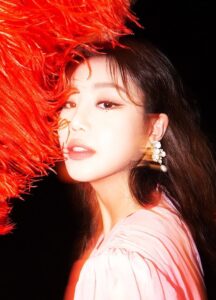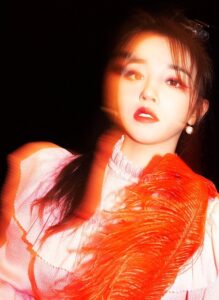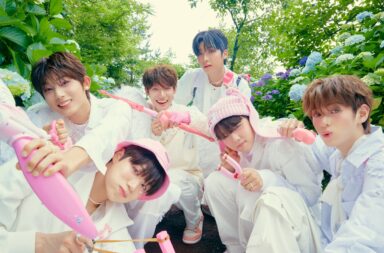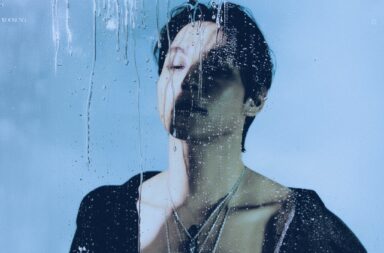
The breakup album. It’s an unofficial right of passage for any artist worth their salt. There is just something about the dying embers of a great romantic passion the makes for great music.
(G)I-dle certainly think so, as they’ve devoted the whole of their fourth mini album I burn to the topic. With so many breakup albums, it’s easy to access the story behind the songs. Of course, since this is K-pop, we had all better hope for (G)I-dle’s sake that we never learn whether I burn’s angst comes from imagination, lived experience, or something in between.
Regardless of its inspiration, I burn is another striking release from (G)I-dle. Regrettably, the album doesn’t live up to the group’s high musical standards. There are several songs that display lazy sonic craftsmanship. Lyrically though, I burn is undeniably compelling. The album uses evocative imagery to imbue its breakup narrative with fantastical poetry. It also has a refreshingly mature perspective, rejecting self-pity and embracing self-awareness. (G)I-dle, and particularly songwriters Soyeon, Yuqi, and Minnie, deserve credit for putting their own spin on a classic subject matter.

I burn’s six tracks are split into two clearly defined halves. The opening trio of songs find (G)I-dle in the throes of grief following a breakup. Later tracks examine what happens when love and longing start to fade. There is a strong sense of the chronological to I burn, with each subsequent song’s message naturally picking up where the previous track left off. It is as if listeners are following (G)I-dle step by step through the aftermath of their romantic separation.
The album’s musical flow is much more lacking. “Hann (Alone in Winter)” and “Hwaa” could be part of the soundtrack for a fantasy film, whereas the rest of I burn has a more modern flair. (G)I-dle have successfully balanced boldly theatrical and cleanly contemporary sounds before, like in their 2020 standout mini album I trust. But where I trust demonstrated intelligent restraint in even its showiest tracks, I burn is frequently musically sloppy.
“Hann (Alone in Winter)” opens the album. It is named after (G)I-dle’s 2018 title track “Hann”, and intended to be a kind of spiritual successor. The song does a good job lyrically establishing the emotionally tempestuous yet reflective state (G)I-dle are in post-breakup. Musically though, “Hann (Alone in Winter)” falls short. The song never offers an ear-catching melodic line, and its orchestral production is a predictable and dated choice.
The production of title track “Hwaa” isn’t quite as disastrous. The verses are solid and the idea of including traditional instrumentation is nice. Unfortunately, the execution of this instrumentation is poor, especially in the choruses of “Hwaa”. What should be stirring musical moments fail to resonate because of the cliched way the traditional sounds are deployed.
These missteps are really too bad because lyrically, “Hwaa” is incredibly strong. In the song, (G)I-dle resolve to cast aside their feelings of despair and proactively make a brighter future for themselves, illustrating their intentions through wonderfully descriptive language:
From this endless season with no promise
Shall erase the scars solely burnt from the days we were not in love
I shall ignite a fire so that my tears dwelling inside won’t live any longer
I shall make a fire, a bigger fire
To win back spring that I’ve lost

“Where is love” is another song that excels lyrically but disappoints musically. The track’s bouncy and auto-tuned production is uninteresting. “Where is love” is also hindered by a multitude of extremely shrill high notes that are genuinely painful to listen to. All this distracts from the thoughtful narrative of the song.
At the start of I burn, (G)I-dle want to wait for their love to return to them, even against their own better judgement. By “Where is love”, they have fully moved on, filled with apathy towards the former object of their adoration. Even as they revel in their newfound lease on life though, (G)I-dle can’t help but wonder where their previously all-consuming passion has gone. “Where is love” captures the simultaneous relief and disappointment of a great love that has breathed its last:
The lost smiles are filled back again, I forget you and find myself
Time gets too late, wait is forgotten
The love that used to be so hot scatters into the sky
Where is love, Where is love
“Moon” isn’t nearly as flawed as “Hwaa” or “Where is love”, perhaps because it isn’t as ambitious. The song is content to be a pleasantly simple ode to (G)I-dle’s desire to hide from prying eyes and let their heartbreak cathartically express itself. Because of its humble goals, “Moon” succeeds in its mission, but doesn’t leave a big impression.

Interestingly enough, I burn‘s two most well-rounded tracks are the only songs on the album not co-composed by Soyeon, (G)I-dle’s primary songwriter. Instead, member participation for “Lost” and “Dahlia” comes from Yuqi and Minnie respectively. This is not to criticize Soyeon, but rather to praise (G)I-dle as a whole for not assigning composition duties to a single person. Fresh perspectives are always beneficial.
“Lost” is arguably I burn’s most conventional track in terms of storyline. It follows on the heels of “Where is love” and complicates that song’s declaration of indifference. In “Lost”, (G)I-dle admit that they occasionally still long for their former love. Rather than passively accepting this yearning though, they vow to overcome it. The combination of helplessness and agency, doubt and determination which fill “Lost” elevate the track beyond standard sad girl music. (G)I-dle may be sad, but they are also masters of their own destiny.
Both “Lost” and “Dahlia” have clean yet impactful musical soundscapes. Their streamlined productions serve to highlight their strong melodic content, the best that I burn has to offer. The eerily pretty chorus of “Dahlia” is especially excellent.

“Dahlia” also closes out I burn’s story in the perfect way: by bringing it nearly full circle. The song finds (G)I-dle tumbling once more into a burning romance. They know that this newest infatuation is probably just as ill-fated as their previous relationship. In spite of this, or even because of it, they willingly succumb:
I’m drunk on the flower called you
No matter what they say, I’ll choose to love you anyway
Cause you’re my Dahlia
Love is whim, I jump into love again
My name is fool, I throw myself in even as I know it’ll change
I burn is far from flawless. That being said, this journey through the land of the broken-hearted is worth taking. The poetic drama (G)I-dle employ in their lyrics does wonders to enhance the album’s narrative of passion, separation, and self-discovery.
Additionally, the album deserves praise for its unconventionally mature breakup story. Throughout I burn, (G)I-dle never tarnish the reputation of their former beloved. They instead take complete responsibility for, and consequently full agency over, their emotions and actions. I burn doesn’t just tell a fantastical breakup story, but also an empowering one.

What comes next for (G)I-dle? Based off the eclectic nature of their discography, it really could be anything. Hopefully, they will find a way to combine the lyrical splendor of I burn with the musical excellence of releases like I trust. If (G)I-dle can harness the best of what they have to offer, then there is not doubt that they will burn listeners up in the most delightful of ways. If not, I burn proves that what they produce will likely still enchant, even as it falls short of their full potential.
(YouTube. Lyrics via YouTube: [1][2][3]. Images via Cube Entertainment)


